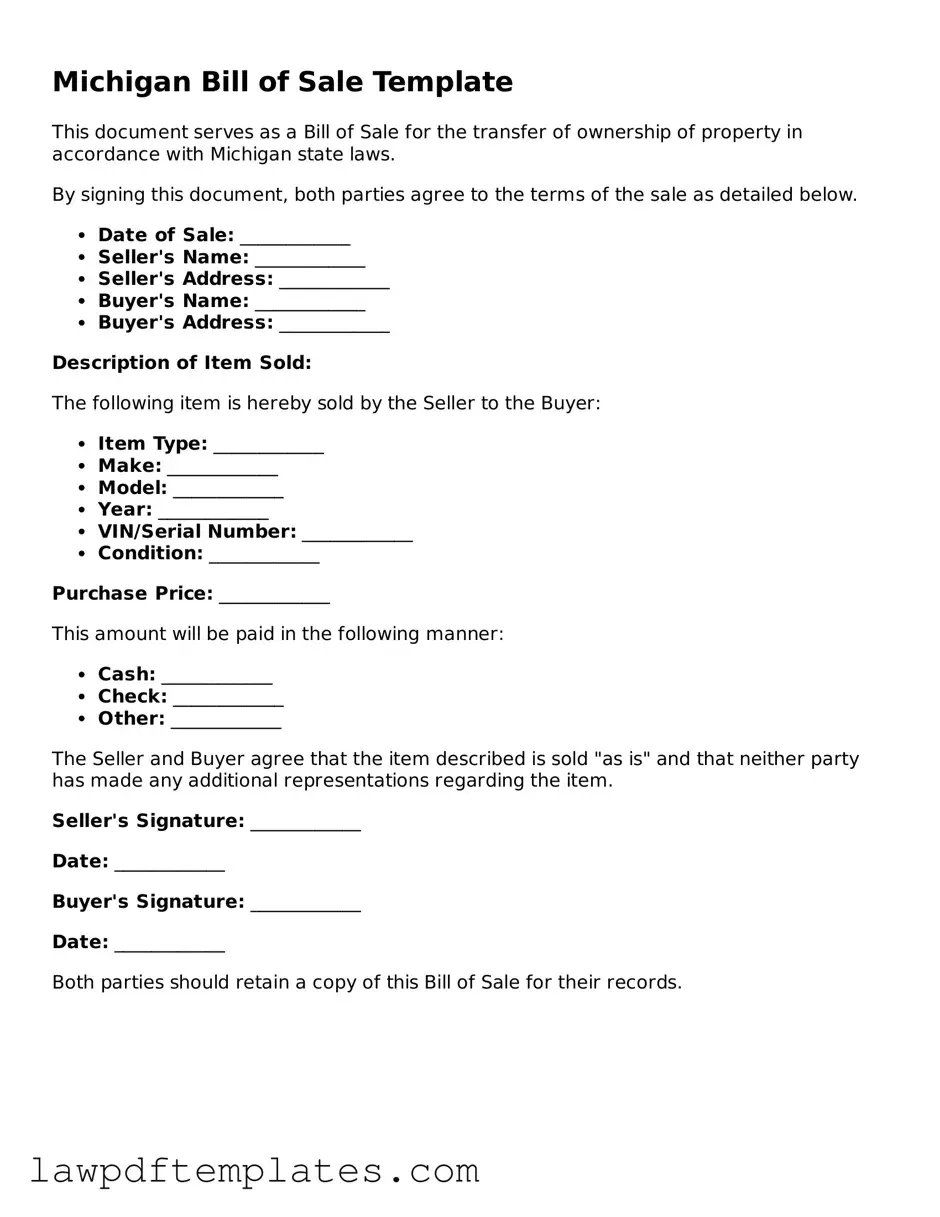Free Bill of Sale Template for the State of Michigan
Form Breakdown
| Fact Name | Description |
|---|---|
| Purpose | The Michigan Bill of Sale form serves as a legal document that records the transfer of ownership of personal property from one party to another. |
| Governing Law | This form is governed by Michigan state law, specifically the Michigan Uniform Commercial Code (UCC). |
| Required Information | The form typically requires details such as the names of the buyer and seller, a description of the item, and the sale price. |
| Notarization | While notarization is not always required, having the document notarized can provide additional legal protection and verification. |
| Use Cases | This form is commonly used for the sale of vehicles, boats, and other personal property, ensuring both parties have a record of the transaction. |
Sample - Michigan Bill of Sale Form
Michigan Bill of Sale Template
This document serves as a Bill of Sale for the transfer of ownership of property in accordance with Michigan state laws.
By signing this document, both parties agree to the terms of the sale as detailed below.
- Date of Sale: ____________
- Seller's Name: ____________
- Seller's Address: ____________
- Buyer's Name: ____________
- Buyer's Address: ____________
Description of Item Sold:
The following item is hereby sold by the Seller to the Buyer:
- Item Type: ____________
- Make: ____________
- Model: ____________
- Year: ____________
- VIN/Serial Number: ____________
- Condition: ____________
Purchase Price: ____________
This amount will be paid in the following manner:
- Cash: ____________
- Check: ____________
- Other: ____________
The Seller and Buyer agree that the item described is sold "as is" and that neither party has made any additional representations regarding the item.
Seller's Signature: ____________
Date: ____________
Buyer's Signature: ____________
Date: ____________
Both parties should retain a copy of this Bill of Sale for their records.
Common mistakes
Filling out a Bill of Sale form can seem straightforward, but many individuals make common mistakes that can lead to complications down the road. One frequent error is not providing complete information about the buyer and seller. Each party's name, address, and contact details should be clearly stated. Omitting any of this information can create confusion and may complicate future transactions.
Another common mistake involves the description of the item being sold. It is crucial to provide a detailed description that includes the make, model, year, and any identifying numbers, such as a Vehicle Identification Number (VIN) for vehicles. Vague descriptions can lead to disputes over what was actually sold, so specificity is key.
People often forget to include the sale price. While it might seem obvious, leaving this field blank can cause issues later on, especially if there are questions about the transaction for tax purposes. Always ensure that the sale price is clearly stated to avoid any misunderstandings.
Additionally, failing to sign and date the document is a significant oversight. Both the buyer and seller must sign the Bill of Sale to validate the transaction. Without signatures, the document may not hold up as proof of sale, which can create legal challenges in the future.
Lastly, neglecting to keep copies of the completed Bill of Sale is a mistake that can be easily avoided. Both parties should retain a copy for their records. This not only serves as proof of the transaction but also provides essential information should any issues arise later. Keeping organized records is an essential practice for anyone involved in buying or selling items.
Discover More Bill of Sale Templates for Specific States
Free Printable:onqmighvyqw= Bill of Sale - A Bill of Sale is a document that transfers ownership of personal property from one person to another.
The Free And Invoice PDF form not only streamlines the invoicing process for businesses but also enhances the clarity of payment requests. For those seeking a reliable resource, Fast PDF Templates can provide excellent templates that ensure a professional presentation of invoices.
State of Georgia Bill of Sale - A Bill of Sale can help establish a clear chain of ownership.
Mass Rmv Bill of Sale - The document outlines the details of the item being sold, such as its description and condition.
